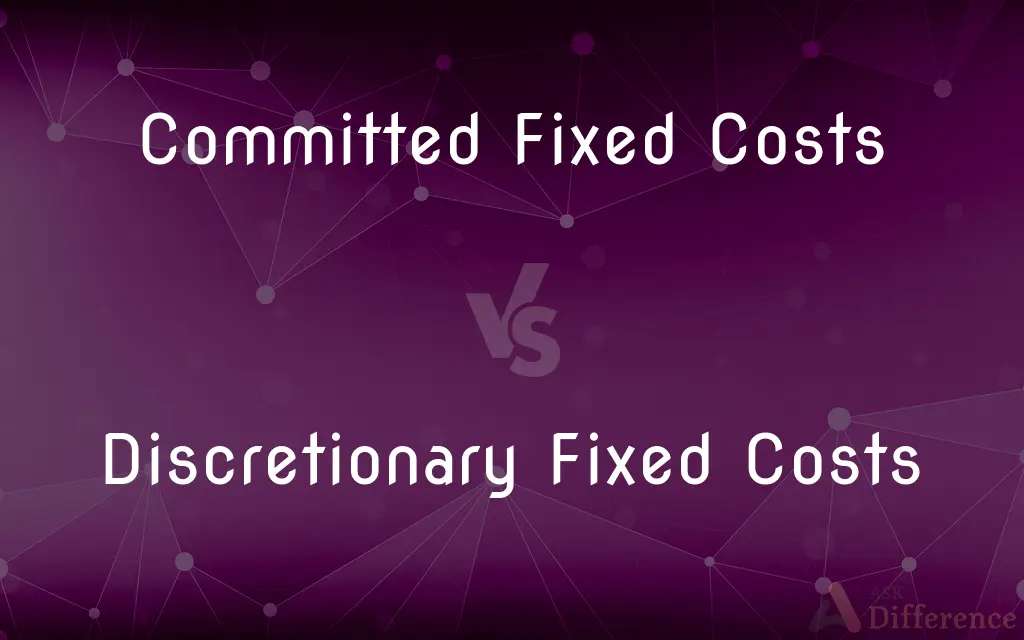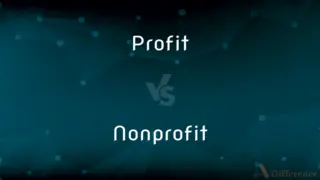Committed Fixed Costs vs. Discretionary Fixed Costs — What's the Difference?
By Tayyaba Rehman — Published on October 24, 2023
Committed Fixed Costs are company's long-term financial obligations, while Discretionary Fixed Costs are variable, often non-essential, and can be altered or omitted.

Difference Between Committed Fixed Costs and Discretionary Fixed Costs
Table of Contents
ADVERTISEMENT
Key Differences
Committed Fixed Costs and Discretionary Fixed Costs represent different financial obligations in business operations. Committed Fixed Costs are those costs that a business is obliged to incur in the long term, such as rent for buildings or lease payments. These costs are unavoidable and typically contractual, remaining constant regardless of the business’s level of production or sales volume. They often involve legally binding agreements and have long-term implications, making them more rigid and less prone to adjustments.
Discretionary Fixed Costs, conversely, are more flexible and pertain to non-essential spending, like advertising or research and development expenses. These costs are variable and are incurred at the discretion of the management, allowing businesses to adjust, reduce, or omit them, particularly during financial strain. They provide companies with the leeway to optimize operational costs according to their financial standing and strategic goals, enabling efficient resource allocation.
While both are categorized as fixed costs, meaning they don’t fluctuate with production volumes in the short term, the key distinction lies in their flexibility and essentiality. Committed Fixed Costs are indispensable, rigid, and incurred due to legal or contractual obligations, whereas Discretionary Fixed Costs are flexible, modifiable, and incurred based on managerial decisions.
Understanding the differentiation between Committed Fixed Costs and Discretionary Fixed Costs is crucial for effective financial management and strategic planning. Recognizing Committed Fixed Costs aids in ensuring that businesses meet their obligatory expenses and maintain financial solvency, while discerning Discretionary Fixed Costs assists in optimizing operational expenditures and aligning them with organizational objectives and financial capacity.
In summary, the discernment and adept management of Committed and Discretionary Fixed Costs are instrumental for businesses aiming to uphold financial stability, optimize resource utilization, and achieve their strategic objectives, highlighting the importance of financial acumen in navigating the economic aspects of business operations.
ADVERTISEMENT
Comparison Chart
Nature
Inescapable and Contractual
Variable and Non-Essential
Flexibility
Rigid and Unalterable
Flexible and Modifiable
Incurrence
Due to Legal or Contractual Obligations
Based on Managerial Decisions
Impact on Business
Essential for Operational Continuity
Influences Operational Efficiency
Financial Management Implication
Crucial for Maintaining Financial Solvency
Vital for Strategic Planning and Resource Allocation
Compare with Definitions
Committed Fixed Costs
Remain constant, irrespective of production or sales volumes.
Salaries for permanent staff are committed fixed costs that don’t vary with production levels.
Discretionary Fixed Costs
Critical for strategic planning and aligning with organizational objectives.
Efficient management of discretionary fixed costs aids in achieving strategic business goals.
Committed Fixed Costs
Essential expenses, requiring precise financial management.
Proper management of committed fixed costs is crucial for maintaining organizational financial health.
Discretionary Fixed Costs
Non-essential expenses, adjustable according to financial capability.
Research and development costs are considered discretionary fixed costs, varying with available resources.
Committed Fixed Costs
Obligatory, long-term financial burdens for a company.
Lease payments are often considered committed fixed costs due to contractual obligations.
Discretionary Fixed Costs
Variable costs, incurred at the management's discretion.
Advertising expenses are discretionary fixed costs, modifiable according to budget allocations.
Committed Fixed Costs
Unalterable costs, integral for operational continuity.
Rent for office spaces are committed fixed costs, ensuring a place for business operations.
Discretionary Fixed Costs
Can be altered, reduced, or omitted based on financial considerations.
Training programs can be discretionary fixed costs, changed according to organizational needs.
Committed Fixed Costs
Incurred due to contractual or legal obligations, impacting financial stability.
Long-term loans signify committed fixed costs affecting a company’s solvency.
Discretionary Fixed Costs
Influence operational efficiency and resource allocation.
Adjusting discretionary fixed costs enables optimal resource utilization and operational efficiency.
Common Curiosities
Are Committed Fixed Costs obligatory for a company?
Yes, Committed Fixed Costs are obligatory, arising from contractual or legal obligations.
Can Discretionary Fixed Costs be altered according to financial capability?
Yes, Discretionary Fixed Costs are flexible and can be modified based on financial considerations and management decisions.
Are Discretionary Fixed Costs essential for operational continuity?
No, Discretionary Fixed Costs are not essential for operational continuity and can be adjusted, reduced, or omitted.
Can Discretionary Fixed Costs be omitted during financial strain?
Yes, Discretionary Fixed Costs can be omitted or reduced during times of financial strain to alleviate financial pressure.
Do Committed Fixed Costs typically involve long-term agreements?
Yes, Committed Fixed Costs usually involve long-term, legally binding agreements like leases or loans.
Is it crucial to accurately account for Committed Fixed Costs in financial planning?
Yes, accurate accounting and management of Committed Fixed Costs are crucial for maintaining financial accuracy and planning.
Do Committed Fixed Costs remain constant irrespective of business activity?
Yes, Committed Fixed Costs remain constant and are not influenced by levels of production or sales volumes.
Can poor management of Committed Fixed Costs affect financial stability?
Yes, improper management of Committed Fixed Costs can jeopardize a company’s financial stability and solvency.
Can Discretionary Fixed Costs vary with available resources?
Yes, Discretionary Fixed Costs can vary and are adjustable according to the available resources and managerial decisions.
Are Committed Fixed Costs integral to a company's operational continuity?
Yes, Committed Fixed Costs are essential and integral for maintaining operational continuity and fulfilling legal and contractual obligations.
Do Discretionary Fixed Costs provide flexibility in financial management?
Yes, Discretionary Fixed Costs offer flexibility and allow for optimization in financial management and resource allocation.
Can Committed Fixed Costs impact a company's financial solvency?
Yes, Committed Fixed Costs are critical and can significantly impact a company’s financial solvency.
Is understanding Discretionary Fixed Costs important for strategic planning?
Yes, understanding and managing Discretionary Fixed Costs are crucial for effective strategic planning and aligning with organizational goals.
Is precise financial management of Committed Fixed Costs essential for organizational financial health?
Yes, precise and prudent management of Committed Fixed Costs is essential for maintaining and ensuring organizational financial health.
Can Discretionary Fixed Costs influence operational efficiency?
Yes, proper management of Discretionary Fixed Costs can enhance operational efficiency and resource utilization.
Share Your Discovery

Previous Comparison
Methylcobalamin vs. Hydroxocobalamin
Next Comparison
Profit vs. NonprofitAuthor Spotlight
Written by
Tayyaba RehmanTayyaba Rehman is a distinguished writer, currently serving as a primary contributor to askdifference.com. As a researcher in semantics and etymology, Tayyaba's passion for the complexity of languages and their distinctions has found a perfect home on the platform. Tayyaba delves into the intricacies of language, distinguishing between commonly confused words and phrases, thereby providing clarity for readers worldwide.












































